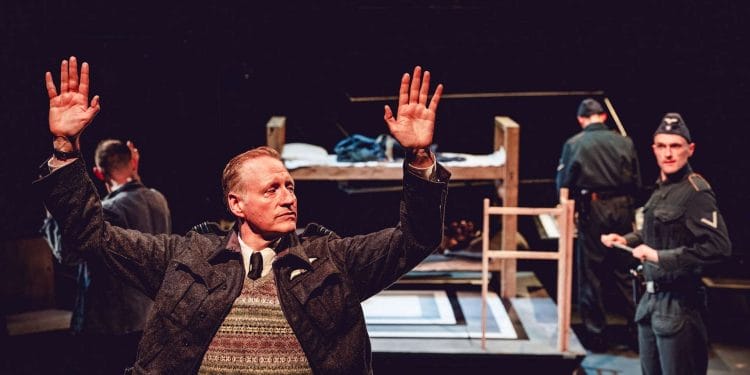 Many of us, at some point or another, will have settled down in that fuzzy period between Christmas and New Year to watch The Great Escape, perhaps due to the liberties the filmmakers took with the script, you’ll momentarily forget that it’s based on a true story. Tom, Dick and Harry which has transferred to the Alexandra Palace Theatre following its premiere at The New Vic, retells that daring story, but from a more authentic vantage point.
Many of us, at some point or another, will have settled down in that fuzzy period between Christmas and New Year to watch The Great Escape, perhaps due to the liberties the filmmakers took with the script, you’ll momentarily forget that it’s based on a true story. Tom, Dick and Harry which has transferred to the Alexandra Palace Theatre following its premiere at The New Vic, retells that daring story, but from a more authentic vantage point.
That’s not to say Tom, Dick and Harry doesn’t take a few liberties either. There most certainly wasn’t a mechanical version of Google Translate around in the 1940’s but it’s inclusion helps explain why we can all understand the German Officers. More importantly, it lets us know early on that this production will be doing things a little differently.
Written by Theresa Heskins (who also directs), Michael Hugo and Andrew Pollard, the story of the legendary escape by prisoners of war from Stalag Luft III is enriched by thorough research undertaken at The National Archives and Imperial War Museum, using Top Secret documents which have now been declassified.
It’s allowed the writers to include details that would have been impossible without contemporaneous evidence. Details of the prisoner’s rations, or the relationships between prisoners and guards are weaved seamlessly into the plot.
One of the details included is that Stalag Luft III had its very own fully fitted theatre (better to encourage escapism than escape). The Alexandra Palace Theatre, grand though it is, does have the feel of a bombed out shell, and with the production presented in the round, with the front row seats made out of Red Cross crates, just as they were in the camp, suddenly the audience feel wholly immersed in the danger and camaraderie of it all.
Indeed, the front row become even more immersed, taking on small speaking parts, or crafting the items that the prisoners will need for life beyond the Stalag walls. Alex Day’s sound design fully completes the experience, with a soundscape that highlights the claustrophobia of confinement, the anticipation of escape, and the elation of getting one over on the guards.
Tom, Dick and Harry, named after the three tunnels that were dug by the prisoners, takes an unexpected approach to the story by making it more of a comedy. Yes, it’s serious when it needs to be; these were terrible times after all. But then we all know that it’s human nature to find the funny side to even the darkest of times.
We see it most in the portrayal of the German Officers, Giesler (David Fairs) and Fritz (Perry Moore) are routinely mocked. Some of the funniest moments are when Lederman (Andrew Pollard) insists that Giesler knocks on a door that isn’t there.
The staging is remarkable, and while the sets are little too noisy when being wheeled in and out (making it difficult to hear the actors on stage), they do a fantastic job of representing the camp. Video projection on the floor puts a modern twist on this classic story, and the actual escape itself looks very simple, but is highly effective.
While the bulk of Tom, Dick and Harry is taken up with the planning and execution of the escape plan, some of the final scenes are comprised of a beautifully poignant monologue by Bob (Michael Hugo), one of the escapees who made it, which is accompanied by some incredibly well thought out physical theatre.
The Great Escape will always hold a special place in the hearts of many, but the thrillingly innovative Tom, Dick and Harry puts a new, and surprisingly funny, spin on things. The performances from the cast are all strong, but it’s the creative team who win the medal for bravery here, with a script that feels truly authentic, and staging that’s nothing short of thrilling.





















Comments 3